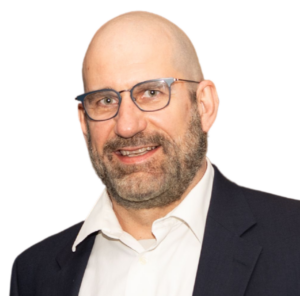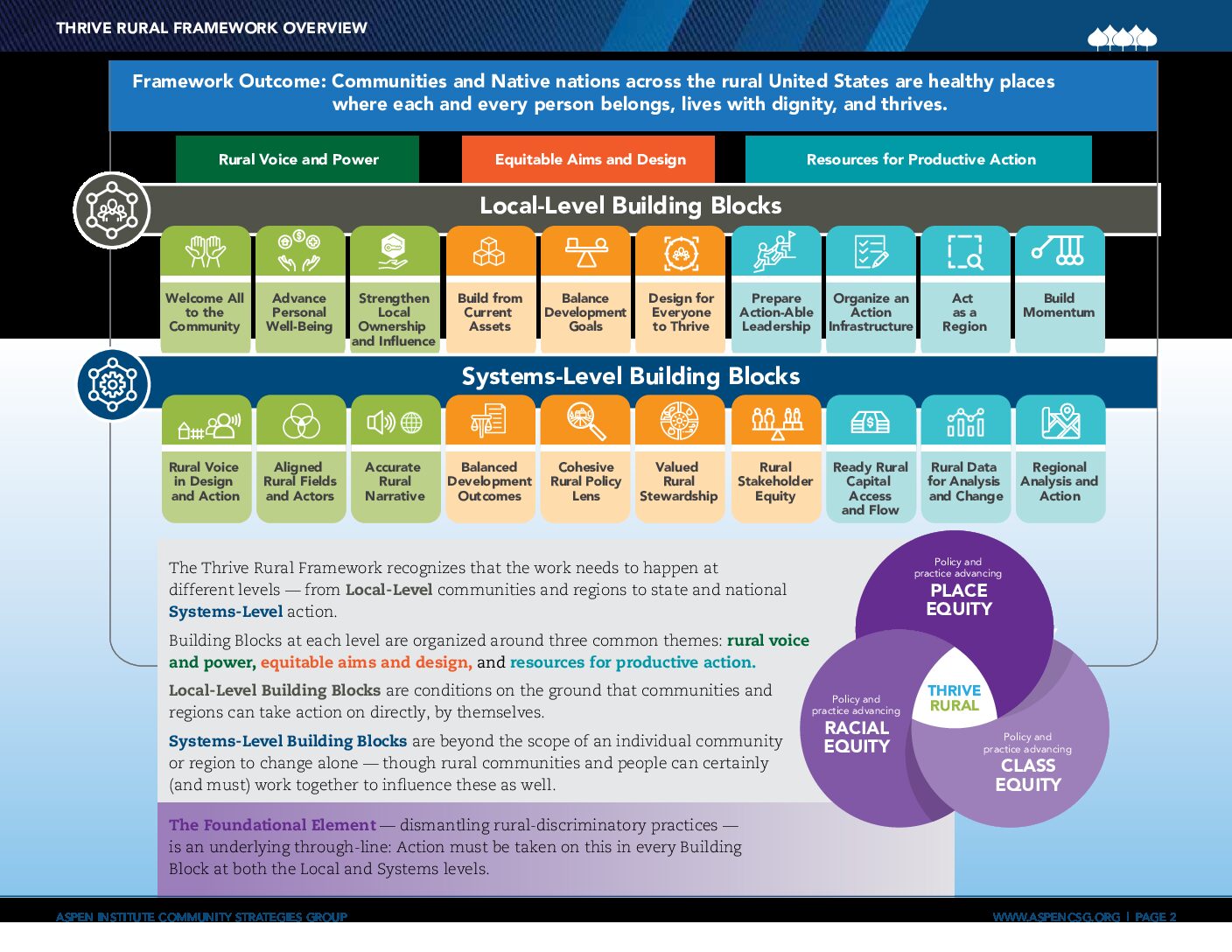The Opportunity
It’s possible to build thriving, prosperous rural communities and Native Nations where each and every person belongs and lives with dignity. We call this outcome: equitable rural prosperity.
To get there, we need ways of thinking and acting that are powerful enough to move communities to action, build shared purpose across regions and change the status quo.
Companion Audio: Rural Threads

Thrive Rural Framework
What does it mean to work toward equitable rural prosperity? Dig into the building blocks at the local and systems levels that communities can use to take stock, target action, and measure progress toward rural prosperity for all people.
Featuring
-

Bonita Robertson-Hardy
Aspen Institute Community Strategies Group
Bonita Robertson-Hardy is Co-Executive Director of the Aspen Institute Community Strategies Group. Through her work as a workforce and economic development professional committed to connecting the public sector, private sector and nonprofit communities, she builds relationships, utilizes her voice to influence policy, and advocates for equity and opportunity in public and private organizations.
Prior to joining the Aspen Institute, Bonita worked at the Greater New Orleans Foundation (GNOF), the community foundation for 13 rural and urban parishes in the southeast Louisiana region. During her eight years at GNOF, she served as Director of Workforce Initiatives as well as Director of Civic Leadership. In these roles she developed employer–led workforce partnerships to train jobseekers and incumbent workers, established an initiative to provide post-hire supportive services for employees at their worksites, led the strategic planning process for the equitable revitalization of an economic development zone within downtown New Orleans, and worked to support and catalyze progressive initiatives to promote growth and equity throughout the region.
A native of New Orleans, Bonita holds a Bachelor of Science Degree in Healthcare Management from Howard University and a Juris Doctorate from Loyola University College of Law. She currently serves as a commissioner of the Ernest N. Morial New Orleans Exhibition Hall Authority and as a board member of Louise S. McGehee school. Bonita is also a past fellow of the Association for Black Foundation Executives (ABFE) Connecting Leaders Fellowship Program.
-

Chris Estes
Aspen Institute Community Strategies Group
Chris Estes is Co-Executive Director of the Aspen Institute Community Strategies Group. He has served as Senior Consultant with the Housing Assistance Council, helping 40 rural organizations across the country build capacity and community development efforts in the face of the pandemic and natural disasters. Prior to that, he served as the Interim Executive Director of the Raleigh/Wake Partnership to End Homelessness, a continuum of care for the county’s homeless programs.
Prior to that, he was Vice President of Business Strategy and Advocacy at Rebuilding Together, where he led its national policy efforts, advanced community revitalization and healthy housing programs, and built new partnerships with national funders and other community development organizations. Chris also served 5 years as President/CEO of the National Housing Conference in Washington, DC, where he led the strategic direction of NHC’s policy, communications and research work and became a national thought leader on affordable housing and community development issues, including the intersection of housing with transportation, education and health.
A native of North Carolina, Chris’s work at the national level has given him insight into federal policymaking and the innerworkings of HUD and USDA-Rural Development, and his experience at the community level in community organizing, affordable housing development, land use and credit syndication has exposed him to good practice, innovations and challenges in states and urban and rural localities across the nation. He served on the board of directors of the Baltimore branch of the Federal Reserve Bank of Richmond and the National Low-Income Housing Coalition.
Chris is a graduate of the University of North Carolina at Chapel Hill (UNC-CH). He holds two master’s degrees from UNC-CH in social work and city and regional planning.
About the Rural Thrive Framework
The Thrive Rural Framework weaves together current community innovations and tested approaches for working together on all issues integral to achieving equitable rural prosperity – from welcoming communities, economic development, and health to civic engagement.
To develop this tool, Aspen CSG convened an inclusive set of practitioners and intermediaries reflecting the diversity of rural places, economies, populations, and cultures from across the country.
The framework calls for an asset-based approach and working across the local and systems levels of change to clarify and address the underlying factors that must be true to create prosperous rural communities where each and every person belongs, lives with dignity, and thrives.
The framework offers a new, complementary focal point for development efforts. Rather than focus on specific needs and issues, it explores shared thinking, equitable goals, the readiness of people and leadership to act, and the organizational structures to learn and act together.
It also helps practitioners and communities take stock and find new, sometimes unexpected, ways to work together on shared challenges and opportunities.
It also connects community needs with larger forces and discussions among national stakeholders. It does this by tracing shared elements such as local leadership, equitable aims, and capacity building through the systemic level.
Critically, the framework confronts and seeks to address the reality that people in rural communities and Native Nations face unique types of systemic discrimination due to race, place, and class.
Discrimination based on place (size or location of the community), race (racial, immigrant, or cultural identity), and class (wealth or income) vary from place to place, but they affect every aspect of life, from who is included in decision-making groups, to design of policies and regulations.
The framework can help stakeholders take stock, target action, and assess progress with these fundamental considerations in mind.

To spark new ways of thinking, the Thrive Rural Framework is designed to be looked at in many ways.
At its core, the framework identifies building blocks for equitable prosperity at both the local level and in the broad landscape, which we call the systems level.
-
Local-Level Building Blocks
Local-Level Building Blocks will be best used by people in communities. They focus on conditions on the ground in rural places that individual communities or regions can work on by themselves.
-
Systems-Level Building Blocks
Systems-Level Building Blocks connect the work at local levels to the discussions among federal policymakers, agencies, and others who design and implement systems that affect rural communities. This necessarily includes community members themselves.
- These blocks focus on conditions that can only be changed through regional and national cooperation, though communities can (and must) act together to influence them.
- Through the involvement of those inside and outside of individual communities, systems-level blocks promote advocacy and cooperation between the two groups.
There are also common elements at both local and systems levels. Each element is meant to spark conversation and support assessment of the design and outcomes of policies and programs.
-
Rural voice and power
Who speaks for rural communities? Is this voice inclusive and unified? Is there an accurate narrative about rural communities in media and dialogue?
-
Equitable aims and design
How are projects/policies being designed? Who ultimately benefits? Have rural voices been taken into account? Are projects and policies aligned, or are they working at cross-purposes?
-
Resources for productive action
Is there leadership, resources, and data available to take action? Are structures in place to enable this action? Do all these factors encourage collaboration at the regional level?
The Thrive Rural Framework is designed to be a living tool that community members, philanthropists, policymakers, government agencies, and business leaders can use to come to agreement on and promote a more widespread and equitable rural prosperity.
How can arts organizations get involved in advancing equitable rural prosperity?
Aspen CSG invites everyone invested in the prosperity and wellbeing of rural communities and regions to use the framework as the starting point of a shared approach.
You can start at any stage in this cycle and build on the work you are already doing. Consider your work and what action might be next based on where you are right now.
-
Take stock
Determine your assets and which building blocks you must focus on to advance rural prosperity for all in your region, role, or system. Use this information to create a strategy and determine measurements of success.
-
Target action
Implement initiatives and programs that strengthen building blocks to broaden and deepen rural prosperity.
-
Gauge progress
Measure your impact and reassess your goals to find new points of action.
Here are three building blocks from the Thrive Rural Framework that we recommend looking at for inspiration, given the unique role of connectors that arts institutions can play in civic and social infrastructure.
What will working like this do for communities?
Together we can recognize a future where rural communities and Native Nations across the rural United States are healthy places where each and every person belongs, lives with dignity, and thrives.
